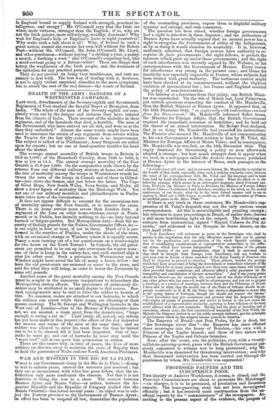HEALTH OF THE ARMY : DANGERS OF A WESTMINSTER CAMPAIGN.
LAST week, detachments of the Seventy-eighth and Seventeenth Regiments of Foot reached the Invalid Depot at Brompton, from India. "The whole of the men of the Seventy-eighth are com- pletely worn out by the fatigue and sickness they have inhaled from the climate of India. Their account of the maladies in their regiment, and of the hundreds that died, is horrible. The men of the Seventeenth who have arrived are all sick, and were so at the time they embarked." Almost the same words might have been used to announce the return of any regiment from service within the Tropics for the last fifty years : there is no improvement. The subject is talked of in Parliament ; Army Surgeons are called upon for reports; but no one at head-quarters troubles his head about the. matter.
The average annual mortality of British troops in Britain is 15.9 in 1,000 ; of the Household Cavalry, from 1830 to 1836, it was as low as 14.5. The annual average mortality of the Foot Guards is 21.6 per 1,000. On the comparative scale shown by the returns from our different military stations at home and abroad, the rate of mortality among the troops in Westminster stands be- tween the rates of the troops in Canada and of those in Gibral- tar—just above the former, and just below the latter. The Cape of Good Hope, New South Wales, Nova Scotia, and Malta, all chow a lower figure- of mortality than the Bird-cage Walk. Yet not one of our military moralists and philanthropists in Parlia- ment takes note of the circumstance.
It does not appear difficult to account for the anomalous rate of mortality among the Foot Guards, or to remove the cause. There is no home service more severe than London duty. A regiment of the Line on other home-stations, except at Ports- mouth or in Dublin, has literally nothing to do—no duty beyond barrack or fatigue-parties. But Metropolitan duty—from, the ne- cessity of finding guards for the Palace, Government Offices, &c.— is one night in four at least, if not in three. Much of it is per- formed in the marshes of Pimlico, under the shade of the trees, with an occasional change to Windsor, where it is equally severe. Fancy a man turning out of a hot guard-room on a winter-night for two hours on the North Terrace! In Canada, the old great- coats are permitted to be cut up into over-coats for winter wear : one of these is hung in the sentry-box, and each sentinel slips it over his other coat. Such a provision in Westminster and at Windsor might have saved the life of many a brave fellow : but here the old great-coats are returned en masse to the store, and sold for what they will bring, in order to lower the Estimates by some odd pounds. Another cause of the great mortality among the Foot Guards must be sought in the numerous temptations to debauchery the Metropolitan station affords. The prevalence of pulmonary dis- orders may be attributed in no small degree to this source. Bar- rack arrangements may be said to drive the soldier to haunts of vice. No common rooms are attached to our barracks, to which the soldiers can resort while their rooms are cleaning or their messes cooking. The St. George and Wellington barracks in the. West end of London--close to the Houses of Parliament—have not we are assured, a room apart from the dormitories, "large enough to swing a cat in." Until lately, (if, indeed, any reform has yet been made in this respect,) the officer of the day inspected the messes and rooms of the men at the same time : and no' soldier was allowed to enter his room from the time he turned out to let it be cleaned till it had been inspected. Out of bar- racks he must go, and out of barracks he must stay until the "roast beef" call at one gave him permission to return.
These are the causes why, in time of peace, the lives of more soldiers are thrown away to maintain the state of Royalty than to hold the garrisons of Malta and our North American Provinces.


























 Previous page
Previous page